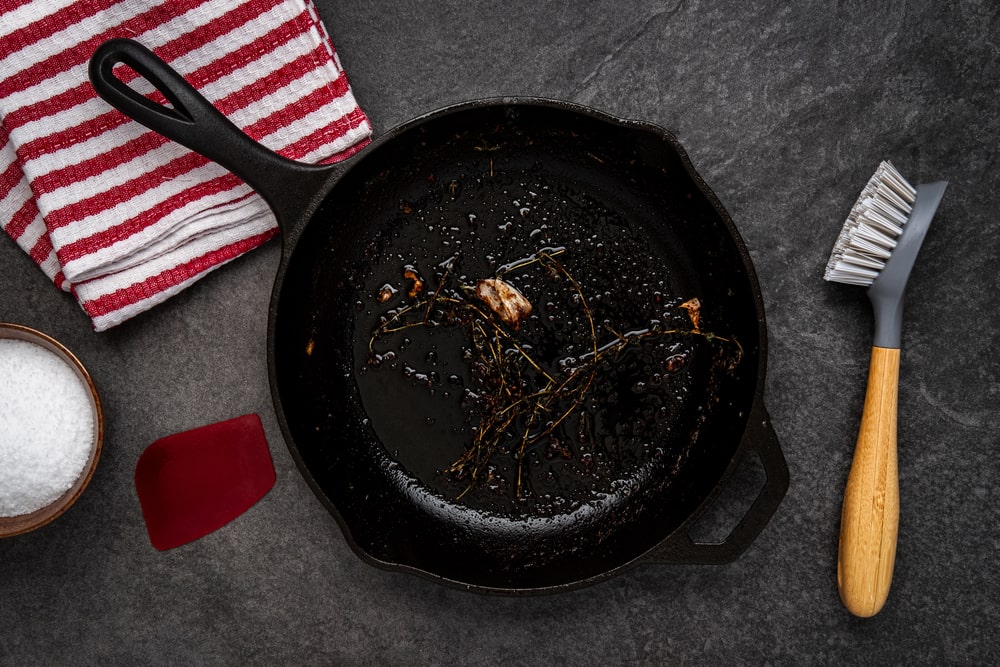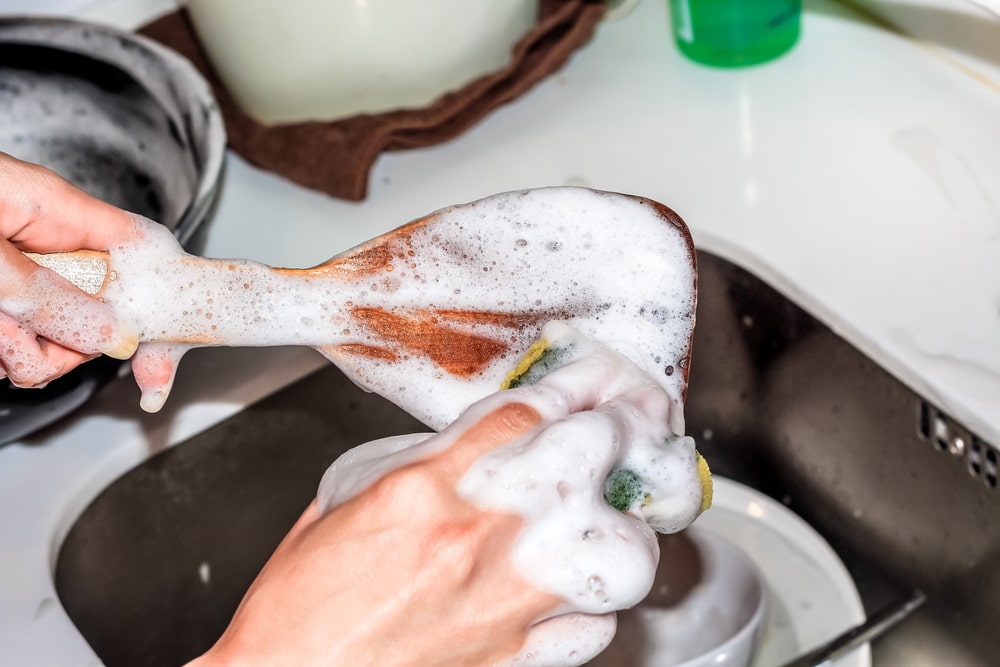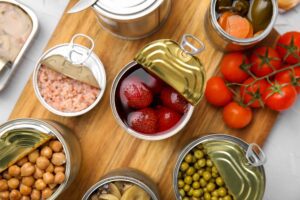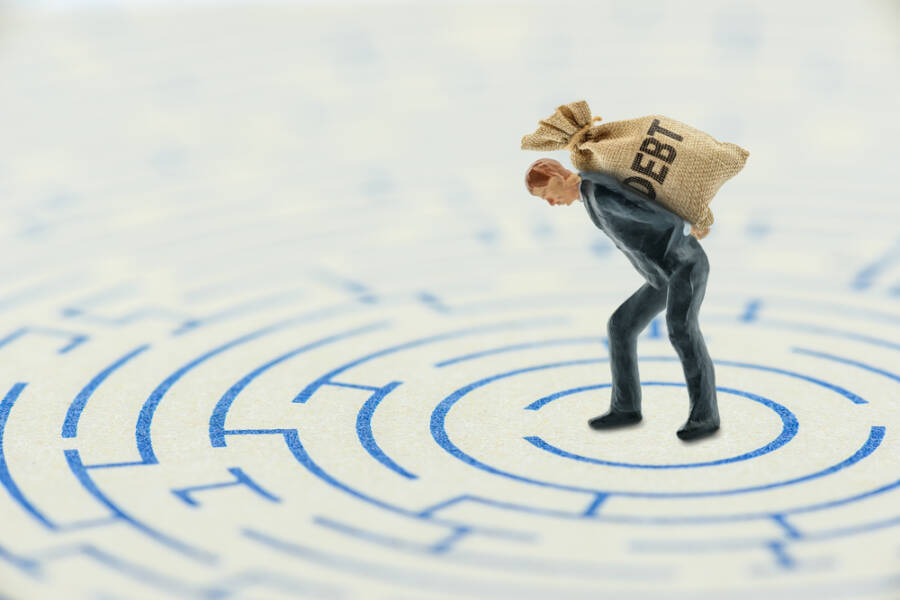These are the best-proven ways to extend the life of kitchen utensils according to the best chefs in the world:
No kitchen, no matter the size, is complete without a set of nice utensils. And if you paid a bunch for every item from it, you must be super careful to prolong their lives as much as possible. Fortunately, you can maintain the best possible condition for your cutting boards, skillets, and knives by following a few simple rules that will become daily habits once you learn how beneficial they are for you and your kitchen utensils.
Let’s see how you can extend the life of kitchen utensils without putting in too much effort:

-
From time to time re-season all your cast iron
We start our list of tips on how to extend the life of kitchen utensils with cast iron pans. These are usually very good for cooking but they’re also a bit pricey if you want to buy them from a well-known dealer.
The supposedly complicated maintenance instructions that come with cast iron cookware deter many home chefs from using it but let me tell you a secret. It would help if you refrained from cleaning cast iron pans with soap since the intention is to preserve the smooth top layer of the pan.
Instead, use coarse salt to scour off any food residue from the pan, and then rinse it clean with warm water. To add one last layer of protection before using it again, finish it with a coat of any vegetable oil of your choice. I usually use sunflower oil because it is the cheapest.
-
Descale the coffee maker
For my family, coffee is the number one priority in the morning. Because of that, we made a financial sacrifice a couple of years back and we bought ourselves a nice coffee maker that’s still functional and in very good shape. Since this is another utensil your kitchen wouldn’t complete without there’s a catch if you want to extend its life as much as possible.
To avoid the accumulation of limescale, your pricey coffee maker or pot may require an occasional general descale. The minerals in tap water are the source of limescale, which can harm your coffee maker and give your coffee a terrible flavor if left untreated. Using vinegar to descale is simple; just be careful to rinse many times to eliminate the vinegar odor.
-
Keep your knives as sharp as possible
You don’t need to be a top-notch chef to want to buy a nice set of knives. Sharpening your kitchen knives regularly can maximize their useful life. However, it’s crucial to understand the difference between honing and sharpening. Your knives’ blades get straighter when you use honing steel, but they don’t get much sharper.
If you want to extend the life of kitchen utensils, in this case your knives I recommend you buy a good sharpener. Amazon has a plethora of options available but I picked the most affordable one for you.
You may wanna take a look! A 4-in-1 Knife Sharpener costs just $$12.99 and you can sharpen blunt knives easily and professionally. The only thing is that this item isn’t suitable for serrated knives.
-
Microwave the sponges
This may sound a tad weird but your sponges also need a bit of extra care if you want to keep them in good shape. Here’s how: By routinely heating your kitchen sponges for two minutes on top, you may simply get rid of any germs they could contain.
The sponge will be sanitized and any potentially dangerous bacteria will be killed by the microwave’s heat.
-
Wooden cutterboards? Oil them regularly
Cutterboards are among the most precious kitchen utensils, and if you want to keep them intact for a long time, you might need to do a few more things besides simply cleaning them after every use.
Once a month, use a food-safe oil to keep your wooden cutting boards looking like new and to stop them from warping and breaking. Although there are solutions designed for this purpose, a homemade approach using mineral oil or beeswax works just as well. Before using a clean cloth to apply oil, make sure your board is thoroughly dry and clean.
Next, before using your cutting board again, let it dry for a whole night. You may prolong the life of other wooden cooking utensils by applying the same procedure.
-
Never use metal utensils on non-stick
Yep, in this case, your non-stick pans have feelings too, and they might end up hurting if you use your harsh metal utensils to turn over the omelet. Preserving the chemical coating of your pans is especially crucial if they are coated in polytetrafluoroethylene, or Teflon.
For maximum pan lifespan when using non-stick cookware, use wood or plastic implements instead of metal whisks or spatulas.
-
Use your dishwasher only for the appropriate type of utensils
For a lot of us, having a dishwasher is a lifesaver. While this machine is destined to help us get the job done in less time, it may be harsh on some kitchen utensils, so it’s better to read if they’re suitable to be put in the dishwasher or not.
In particular, knives should always be cleaned by hand and dried right away to maintain their sharp edges. Similarly, wooden utensils and cutting boards should never be washed in the dishwasher to prevent warping. Enamel-coated cast iron and iron cookware should also be washed by hand.
-
Forget about cooking spray!
Cooking sprays are a popular calorie-saving alternative to butter or oil for greasing nonstick cookware among people who cook at home. But a lot of these sprays have lecithin in them, which is a solvent that can build up unintentionally on the surface of your pan. Use a tiny bit of butter or oil in place of the spray to prevent this rough coating.

-
Scrub each utensil
After putting the cutlery inside the sink, wipe it down with a sponge or dish brush. After that, rinse the utensils well under running water from the faucet. Ensure that all traces of cleaning products have been eliminated.
-
If your kitchen utensils are stained apply lemon or salt
To extend the life of kitchen utensils, it is also important to wash them thoroughly and keep them as squeaky clean as possible. If you discover that some of them have stains from the food that won’t go away just with soapy, warm water, try using some lemon and salt.
Slice a lemon in half, then sprinkle some salt over one of the halves. Scrub the wooden utensils with a lemon and salt solution; if stains remain, apply baking soda and lemon juice.
-
Read the instructions for your utensils
All kitchen appliances, no matter how big or small, have handbooks that include maintenance tips from the manufacturer. It’s crucial to educate yourself on the proper cleaning and maintenance procedures for your specific tool to guarantee optimal performance, as these guidelines vary based on the product category and specific item.
How do you take care of your kitchen utensils? Tell me in the comments.
If you want to know more hacks about how to extend the life of kitchen utensils you can check out another article from our page: Can You Make Your Favorite Kitchen Knives Last Longer? 8 Tips to Try!














